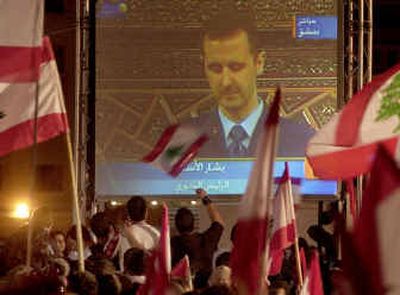Syria pullout from Lebanon to be gradual, angering U.S.

BEIRUT, Lebanon – Syrian President Bashar Assad on Saturday announced a phased withdrawal of Syrian forces from Lebanon, drawing the immediate ire of U.S. officials, who had called for a complete and immediate evacuation of Syrian soldiers and agents from the country they have come to dominate.
Speaking to the Syrian parliament in Damascus, a defiant Assad seemed determined to display Syrian imperviousness to foreign pressure, refusing to say how soon the soldiers would pull out. The troops first would move to the Bekaa Valley, a strip of villages and farmlands near the Syrian border, the president said. Then the Syrians and Lebanese would negotiate a move to the frontier between the two countries, but Assad didn’t say which side of the border they would occupy.
In a downtown Beirut plaza, thousands of jeering and anxious demonstrators watched Assad’s speech live on massive television screens. They hooted with laughter when the Syrian president coughed and booed his claims that Syria wanted to protect the Lebanese. But a rowdy cheer swept the crowd when they heard Assad say that the soldiers would retreat.
For most of the flag-waving demonstrators, however, excitement was tempered with skepticism. “We want a free Lebanon, and this is not enough,” said Sari Haddad, a 26-year-old bank employee. “They have to leave completely.”
Syria won international approval to keep tens of thousands of soldiers within the borders of its tumultuous neighbor as part of a 1989 deal that ended Lebanon’s civil war. Back then, the Syrians were supposed to serve as a peacekeeping force to watch over Lebanon’s warring sects, and leave once the fighting ended.
But the Syrians, who arrived here three decades ago, never left. Although Damascus has reduced the number of soldiers stationed in Lebanon, it has made up for the lowered military profile by bolstering its hold on Lebanon’s politics and economy. Last year, the U.N. Security Council passed a resolution calling for the liberation of Lebanon from foreign troops.
Anti-Syrian resentment here exploded onto the streets after former Lebanese Prime Minister Rafik Hariri was assassinated in Beirut last month. Many Lebanese blamed Syria for the bomb attack, and his funeral began weeks of round-the-clock protests in Beirut. The pressure spread to Syria’s allies, leaving Assad little room to ignore the calls to leave.
On Saturday, U.S. officials immediately denounced Assad’s announcement as inadequate. Nothing short of a full Syrian withdrawal from Lebanon before scheduled May elections would be acceptable, they said. In his weekly radio address, Bush demanded that all foreign forces be withdrawn.
“A Syrian withdrawal of all its military and intelligence personnel would help ensure that the Lebanese elections occur as scheduled in the spring and that they will be free and fair,” Bush said.
The Syrian president plainly had anticipated U.S. dissatisfaction with the phased withdrawal. “They may say this isn’t enough,” Assad told lawmakers. “But we say it’s enough.”
In a conciliatory tone, Assad reminded the world that a Syrian withdrawal isn’t as simple as it sounds: Damascus has penetrated Lebanese institutions and stationed thousands of intelligence agents in Lebanon, ensuring that its influence will linger long after the soldiers leave.
“Syria’s withdrawal from Lebanon does not mean the absence of Syria’s role,” Assad said. “Syria’s strength and its role in Lebanon does not depend on the presence of its forces in Lebanon.”
Assad’s speech was punctuated by swipes at the U.S. administration and at the Lebanese demonstrators who have called for Syria to remove its estimated 14,000 soldiers.
With a hint of menace, Assad said the United States would have to take responsibility for the consequences of a Syrian withdrawal. The veiled threat evoked the traditional justification given by Damascus to explain its chokehold on Lebanon: that without Syria keeping the peace, the smaller neighbor would dissolve once again into civil war.
Although Bush and other senior officials have been emphatic in demanding that Syria quit Lebanon, other U.S. officials were careful to note that the United States alone cannot be responsible for forcing Syria to withdraw or for keeping the peace there afterward.
“We’re doing this together with the U.N., so there’s a limit to how many answers we have,” an administration official said. “The U.S. did not break Lebanon. Everybody broke Lebanon. So everybody has to have a hand in fixing it.”